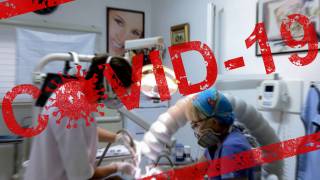‘Long-COVID’ Care Networks Established in England

Patients suffering ‘long COVID’ symptoms will be offered specialist care at clinics across England, the head of the NHS announced.
Respiratory consultants, physiotherapists, other specialists, and GPs will all help assess, diagnose and treat thousands of sufferers who have reported symptoms ranging from breathlessness, chronic fatigue, “brain fog”, anxiety and stress, stated the NHS’s chief executive, Sir Simon Stevens, on October 7, 2020.
Increasing medical evidence and patient testimony are showing that a small but significant minority of people who contract COVID-19 cannot shake off the effects of the virus months after initially falling ill.
Some estimates in the UK suggest that 10 percent of COVID-19 patients may still be experiencing symptoms more than 3-weeks after infection, and perhaps 60,000 people could be suffering from long COVID-19 symptoms after more than 3-months.
Sir Simon said in a press statement that the ‘new network will be a core element of a 5-part package of measures to boost NHS support for long COVID-19 patients.
Designated ‘Long COVID clinics’, as announced today. This will involve each part of the country designating expert one-stop services in line with an agreed national specification. Post-COVID services will provide joined-up care for physical and mental health, with patients having access to:
- A physical assessment, which will include diagnostic testing, to identify any potential chronic health issues,
- A cognitive assessment, to assess any potential memory, attention, and concentration problems,
- A psychological assessment, to see if someone is suffering potentially from depression, anxiety, PTSD, or another mental health condition.
This service will be available to anyone suffering symptoms that are likely due to COVID-19, regardless of location or whether they have spent time in the hospital. It is most likely that patients will access the service through their GP, but they could also be referred through another healthcare professional following assessment.
Patients could also then be referred from designated clinics into specialist lung disease services, sleep clinics, cardiac services, rehabilitation services, or signposted into IAPT and other mental health services.
Sir Simon Stevens added: “While this is still a relatively new virus, we are learning more about COVID with every passing week. It is now clear that long COVID can have a major impact on the lives of a significant minority of patients weeks or months after they have contracted the virus.”
“So just as the NHS quickly put in place specialist hospital care for acutely ill COVID patients at the start of the pandemic, now we must respond sensitively and effectively to these new patient needs.”
The new services will follow the launch of the long COVID clinic at University College London Hospital (UCLH) earlier this summer where they have treated over 900 people with long COVID symptoms, including those who were not admitted to the hospital with the illness.
UCLH Chief Executive, Professor Marcel Levi, said: We support moves to increase access for the growing patient groups with post-COVID-19 symptoms and the efforts to treat and rehabilitate patients who are often young and their quality of life has been seriously impacted. There is a growing need to understand and offer access to care especially when, as a new illness, many struggle to access adequate care through traditional routes.”
Tim Spector, Professor of Genetic Epidemiology at King’s College London (KCL), and lead investigator of the ZOE KCL COVID Symptom Study app said: “We are glad that the need to help long COVID sufferers has been recognized.”
“Using clinical data from the over four million people who downloaded the COVID Symptom Study app run by ZOE and KCL, we have a unique insight into the long-term problems suffered by COVID-19 patients who didn’t go to the hospital.”
“Our data shows us that over one in 10 still have problems a month on and around one in 50 are still suffering after three months. Long COVID sufferers experience a broad range of symptoms, which include up to 20 different problems and not just the three ‘classic’ symptoms used for diagnosis. This tells us that this is a multisystem disease that requires a multi-disciplinary approach to treatment.”
The UK’s Health and Social Care Secretary Matt Hancock said: “Long COVID can have a huge impact on people affected. So we are doing everything we can to support people who are still suffering from effects on their health.”
“Combined with further research and the new NHS England Long COVID taskforce, these additional services will ensure people get the care they need, improve lives, and aid in the fight against this global pandemic.”
CoronavirusToday publishes research-based COVID-19 news.
Our Trust Standards: Medical Advisory Committee

























